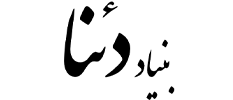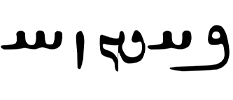DGO: dar ēcand az gōbišn ī Ōšnar ī purxrad | Some passages of the treatise of Aošnara of much wisdom
Raham Asha
Thanks to the TD 26 we have a résumé of Aošnara’s treatise different from the Handarz ī Ōšnar ī Dānāg. These two versions come from an original book, the Jāyēdān Xrad ‘Eternal wisdom’. Here we give this text, edited by Raham Asha.
pārsīg
ēv, abardum vehīh ped mardōm xrad veh.
didīgar, az kirbag kirdan pašīmān nē būdan.
sidīgar, ped harv kār (ud) dādestān abardum tis toxšāgīh veh.
cahārum, dušvārdum tis xvēštan stāyīdan.
ēn kū az cilān tēzdar xēšm, az /tārīkīh/ tārīkdar dušāgāhīh.
abardum dānāgīh <hān> ī ped dēn ud dēn-dastvarīh ud ēn āvām ud hān āvām vēned ud dāned.
*
do tis ēn veh:
<ēk> soxan ī /staft/ ō kas nē guftan;
didāgar ēn kū az vattarān tis nē xvāstan.
do hend kē dušmen vēš bavend:
ēk, zadār mard;
didīgar, pehikuftag mardōm.
do hend kē hamēšag zahr ō dil ōbast ēsted:
ēk, driyuš mard kē tis nēst u-š hamvār az kasān <tis> abāyed xvāstan;
didīgar, ruvān kē abāg durvandān raved.
do tis hamvār aziš abāyed handēšīdan:
ēk, az āvām;
ud didīgar, az vattarān.
do tis kas aziš virīxtan nē tuvān:
ēv, az kunišn ī xvēš;
ud ēv, az zamān ī brihēnīd.
do tis az vattarān dūr baved:
<ēk>, xēm ī nēk;
didīgar, dōst ī ēkānag.
ped cahār tis mard nām abērdar šāyed xvāstan:
ped rādīh ud rāstīh ud xrad ud dānišn.
do tis peymānag nēst:
ēk, kirbag;
ud didīgar, dānāgān dōst būdan.
do tis ped dānāgīh abāz šāyed dāštan:
ēk, xvadāy ī anešnās;
didīgar, zan ī duš- /āgāh/ ī vadxēm.
sē hend kē kirbag vēš kunend bar aziš vindend ud pašīmānīh aziš nē baved:
ēk, xvadāy kē andar bannagān huspās;
didīgar, bannag kē andar xvadāyān ēkānagīh kuned;
sidīgar, zamīg ī nēk ka varz pediš kuned.
sē tis rāy nēkīh abērdar kunišn:
ēk, rāmišn ī xvēš;
didīgar, pesann ī vehān;
sidīgar, bīm ī dušox.
cahār hend kē sagr kirdan nē šāyend:
ātaš az ēzm,
ud drayā az āb,
ud zan az mard,
ud āzvar mard az xvāstag.
cahār hend kē ped kār framāyišn veh nē:
zan ī jādūg;
ud frazend ī vad;
ud mizdvar ī vadgōhr;
ud bannag ī vināhgār.
sē tis ka aziš bē varded veh:
<ēk, az> mard ī anešnās;
didīgar, az /jahī zan??/;
sidīgar, az zamīg ī vadvarz.
sē tis andar gāh šāyed dānistan:
xrad andar kār;
xēm andar pādixšāyīh;
dōst ud dušmen andar astānag.
panz tis ped dānāgān baved:
ēk, ped hān ī šud ud uzīd ēsted dard ud bēš nē burdan;
didīgar, kē ped hān tis umēd dāred ī sazed dāštan (×būdan);
sidīgar, ped hān ī /mad?/ ēsted hunsand;
cahārum, kē kār hān frāz gīred ī-š tuvān /kirdan/;
panzum, kē ped nēkīh vas /mast/ nē, ped anāgīh ī rased hunsand baved.
haft āhōg ped dušāgāhān baved:
ēk, kē abēgāh vas xanned;
didīgar, kē abēcim xēšm gīred;
sidīgar, kē vehān nē mened;
cahārum, kē tan (ruvān??) ī xvēš nē dōst;
panzum, kē soxan ī abēsūd vas gōbed;
šašum kē rāz /nē/ dāred;
haftum, kē ped harv kas vistāx baved.
ēn and tis abrōzišn ī xvarrah hend:
rādīh ud rāstīh ud xrad ud toxšāgīh ud pākīzagīh.
nōh tis ēn /dušcihrdar/ ud /zyāngārdar/:
ped šahriyārān ud dānāgān xēšmenīh;
ud ped tuvānīgān penīh; ud ped driyušān abarmenišnīh;
ud ped zanān /aframānīh/;
ud ped bizeškān vēmārīh;
ud <ped> mahādarān /aburnāyagīh/ ud rēdakīh;
ud ped dādvarān drōzanīh;
ud ped driyušān /zanišnīh??/.
šaš hend kē ped kirbag kirdan ayyār nē hend:
ēk, kē az may mast;
didīgar, kē az nēkīh anumēd;
sidīgar, kē dušāgāh;
cahārum, /varanīg/ ī ped varan;
panzum, āzvar;
šašum, kē hamāg rōz xvaft ēsted ud toxšāgīh ped frārōnīh nē kuned.
ped tan ī mard vizīdār-dahišnīh veh;
ped tis xvāstan carbīh veh;
ped zanān vistāx nē būdan veh;
frazend pid ud mād ō frahangestān kirdan veh, ud frazend ped frahang andar mērag ud avistād framānburdār būdan veh;
ped hambār <kirdan> kirbag veh, nē kirdan bazag veh.
*
pursīd kū:
xrad ped cē vēš abzāyed?
ud hunar ped cē vēš baved?
ud xēm ped cē vēš vīrāyed?
guft <kū>:
xrad ped hamōzišn,
ud xēm ped hunsandīh,
ud hunar ped toxšāgīh.
pursīd kū: ēv cē, ud do cē, ud sē cē?
guft kū: ēk nar, ud do /māyag/, ud sē frazend.
pursīd kū: nar cē, ud māyag cē, ud frazend cē?
guft kū: nar tištar, ud māyag zamīg, ud frazend dār ud draxt.
pursīd kū: kas ast /kē-š/ ō kas niyāz nēst?
guft kū: hān kē ped hān ī mad ēsted hunsand ō kas niyāz nēst.
ped mardōmān sē tis cē /vattar/?
varanīgīh ud xvaddōšagīh ud xēšmenīh.
pursīd kū: farroxīh veh ayāb dānāgīh ?
guft kū: nē ped farrox dārišn hān ī nē dānāg; ud ka farrox dušāgāh /baved/ <…>.
*
<…> xēšm tēzdar az ātaš; soxan ī spazgān vattar; <ped tan> xūn garmdar; /ped/ gēhān āb ped-nērōgdar; ud az rōvn vārān carbdar; ud az angubēn mihr <ī> pid<ar> ud mād<ar> šīrēndar; ud az mēvagān xurmā šīrēn<dar>, ud gōz carbdar; ud vāng ī driyušān bulanttar; xvāstag hān vēš ī hunsanttar; ped panāh xēm ī frārōn veh; Spendarmed barumanttar; ped vehīh dādār ī harvispāgāh veh; ped vattarīh Ahrmen durvand vattar.
<sē …, ēk … ;> didīgar, az ; sidīgar, az zamīg ī vadvarz. (rep.)
sē tis <andar> gāh šāyed dānistan: xrad andar kār; xēm andar pādixšāyīh; dōst ud dušmen andar astānag. (rep.)
English
First, the most excellent thing for men is wisdom.
Second, one should not repent of doing good.
Third, the topmost thing in any work or affair is diligence (or, effort).
Fourth, the most disagreeable thing is to praise oneself.
This (too) that: sharper than a dagger is wrath; darker than darkness is ignorance.
The topmost knowledge is that of the religion, that of the text of the religion, (i.e.) to see and know this world and that world.
*
These two things are better:
one is not to pronounce a rough word to anyone;
the other is not to ask anything of the wicked.
There are two (persons) whose enemies are more:
one is a hostile man;
the other is a quarrelsome man.
There are two (persons) who have always impregnated the heart with poison:
one is a poor man who does not have anything and always wants to ask (things) from others;
the other is a soul who goes with the deceitful.
One should always be worried about two things:
one, about the (bad) period;
the other, about the wicked.
No one can escape from two things:
one, from one’s action;
the other, from the destined time.
There are two things which are far away from the wicked:
one is good character;
the other is a loyal friend.
There are four things by which man can seek fame much more:
generosity, truth, wisdom, and knowledge.
(One must not follow) moderation in two things:
one, in doing good;
the other, in being friend of the wise.
Two things can be kept away by means of knowledge:
one is an unintelligent master (of the house);
the other is an ignorant woman who is of bad character.
There are three (persons) who do good more whereof they find benefit and will not repent:
first, a master who is grateful to his servants;
second, a servant who is loyal to his master;
third, a good field wherein one tills.
There are three things for which one should do good much more:
first, one’s own peace (or, pleasure);
second, the approval of the good;
third, the fear of hell.
There are four that can not be satiated:
fire from fuel;
sea from water;
woman from man;
a greedy man from money.
There are four (persons) whose employment is not good:
a woman who is witch;
a child who is bad;
a hireling who is of evil nature;
and a servant who is mischievous.
It is better to turn away from these three:
first, a man who is unintelligent;
second, a woman who is a witch;
third, a field which is difficult to be tilled.
There are three that can be known at the appropriate time:
wisdom in (time of) work;
character in (time of) power;
friend or enemy in (time of) distress.
There are five things (or, virtues) pertaining to the wise:
first, not to experience pain and suffering for that which has departed and gone out;
second, to hope for that which can be realized;
third, (to be) content with that which has come;
fourth, to embark on a work which one can do;
fifth, not to be intoxicated with welfare, and to be content with the calamity which reaches.
There are seven vices pertaining to the ignorant:
first, one who laughs out of place;
second, one who becomes angry without reason;
third, one who does not care for the good;
fourth, one who does not like oneself (or, one’s soul);
fifth, one who talks much futile talk;
sixth, one who does not keep a secret;
seventh, one who has confidence in every person.
These things illuminate (one’s) Fortune:
generosity; truth; wisdom; diligence; and cleanliness.
These nine things are more hideous and more damaging:
anger among political and spiritual leaders;
meanness among riches;
haughtiness among the poor;
disobedience among women;
sickness among physicians;
childishness and puerility among seniors;
lie among judges;
and battery among the poor.
There are six (persons) who do not help to do good:
first, one who is intoxicated with wine;
second, one who is hopeless in doing good;
third, one who is ignorant;
fourth, a lusty person who is governed by evil desires;
fifth, a greedy person;
sixth, one who is dormant all day long and does not make honestly any effort.
[Among good characters or duties:]
For the body of a man discrimination in giving is better;
for asking some thing mildness is better;
for women not being bold is better;
for parents putting a child down to school is better, and for children showing obedience to their master and professor is better;
for storing good deed is better, and for not storing evil deed is better.
*
[The disciple] asked:
By what may wisdom increase more?
By what may skill (or, virtue) become more?
And by what may character be reformed more?
[Aošnara] said:
Wisdom (increases more) by instruction;
character (is reformed) by contentment;
skill (becomes more) by effort.
He asked: What is one, what two, and what three?
He said: One is a male, and two is a female, and three are (their) offspring.
He asked: What is a male, and what a female, and what (their) offspring?
He said: The male is Tištrya; the female is the earth; and the offspring is the bushes and trees.
He asked: Is there anybody who needs nobody?
He said: That one who is content with that which has come does not need anybody.
[He asked:] For men which three things are worse?
[He said:] Lustfulness, egoism, and wrathfulness.
He asked: Fortune is better or knowledge?
He said: Not to consider fortunate one who is not savant; and when a fortunate (person) is ignorant … (the rest of the answer is missing.)
*
… Wrath is sharper than fire; the words of the slanderous are worse; <in the body> blood is more warm; in the world water is more potent; rain is more unctuous than oil; parents’ affection is more sweet than honey; among the fruits date is more sweet, and walnut is more unctuous; the voice (/ cry) of the poor is more loud; the wealth of that one is more who is more content; as refuge the honest character is better; Spəṇtā Ārmaiti (the earth) is more fruitful; in good the omniscient creator is better; in evil the deceitful Aṇgra Mainyu is worse.

